At a summit held in Jarkata, Indonesia, Sept. 5–7, U.S. Vice President Kamala Harris announced that the United States and the Association of Southeast Asian Nations (ASEAN) are creating a U.S.-ASEAN Center in Washington, D.C. Toward that end, the U.S. State Department has established a public-private partnership with Arizona State University to launch the center.
The center will further institutionalize and deepen the relationship between the United States and ASEAN while bolstering support for U.S. economic and cultural engagement with Southeast Asia.
“ASU has a long record in ASEAN, building high-impact, public-private partnerships to develop sustainable capacity projects with the U.S. government,” said Jeffrey Goss, executive director in the Office of Global Outreach and Extended Education, part of ASU's Ira A. Fulton Schools of Engineering. “We are excited to partner with the State Department and ASEAN Secretariat to develop joint research, student and faculty exchanges, academic program partnerships and pathways and other outreach activities to promote and support the comprehensive partnership between the U.S. and ASEAN.”
Since the establishment of the multinational partnership in 1977, ASEAN and the United States have built extensive cooperation in political-security, economic and socio-cultural areas. ASEAN includes Brunei, Cambodia, Indonesia, Laos, Malaysia, Myanmar, Philippines, Singapore, Thailand and Vietnam.
The U.S. is the largest source of foreign direct investment in Southeast Asia, and more than 6,200 U.S. businesses have contributed to a record $520.3 billion in total trade between the U.S. and the nations of ASEAN in 2022, creating 625,000 jobs in all 50 states and 1 million jobs throughout Southeast Asia. The new center’s activities will be aimed at supporting the United States’ and ASEAN’s joint efforts to promote an open, connected, prosperous, resilient and secure region.
ASU has been working actively in the ASEAN region through a portfolio of public-private partnership projects with the U.S. State Department, United States Agency for International Development, and U.S. and international industry partners for more than a decade. Recent projects include: the Lower Mekong Young Scientist partnership, ASEAN Science Technology, Innovation Cooperation, Vietnam BUILD IT Higher Education project and the Indonesia Higher Education Partnership Initiative.
“Our involvement with the ASEAN Center reflects our relationship with the the partner nations of ASEAN and the United States of America,” ASU President Michael Crow said. “Today, we're working together to build economic opportunity, to build future technology development, to build economic competitiveness and people-to-people engagements on a regional scale.”
“Arizona State University has played a role assisting American companies and the U.S. government, and we have been invited by the U.S. State Department and ASEAN Secretariat to do a range of activities,” Crow said. “So, from ASU’s perspective, this is the next step, and through the ASEAN Center we will extend our collective programs and partnerships across the ASEAN region.”
The State Department said it is proud to partner with ASU for this important component of the U.S.-ASEAN Comprehensive Strategic Partnership. It noted that ASU has a longstanding demonstrated commitment to academic programs and studies on issues in Southeast Asia, particularly in Vietnam.
Further, with an academic presence in Washington, D.C.; Tempe, Arizona; Los Angeles, California; as well as throughout Southeast Asia, the State Department also expressed confidence in ASU, calling the university “well-positioned to facilitate coordination with ASEAN, as well as with key private sector organizations and academic institutions across the ASEAN region.”
Top photo of Washington, D.C., courtesy Unsplash
More Science and technology

Breakthrough copper alloy achieves unprecedented high-temperature performance
A team of researchers from Arizona State University, the U.S. Army Research Laboratory, Lehigh University and Louisiana State University has developed a groundbreaking high-temperature copper alloy…

4 ASU researchers named senior members of the National Academy of Inventors
The National Academy of Inventors recently named four Arizona State University researchers as senior members to the prestigious organization.Professor Qiang Chen and associate professors Matthew…

Transforming Arizona’s highways for a smoother drive
Imagine you’re driving down a smooth stretch of road. Your tires have firm traction. There are no potholes you need to swerve to avoid. Your suspension feels responsive. You’re relaxed and focused on…


